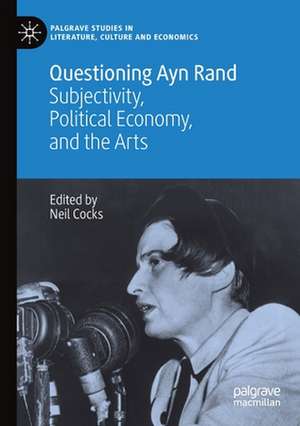Questioning Ayn Rand: Subjectivity, Political Economy, and the Arts: Palgrave Studies in Literature, Culture and Economics
Editat de Neil Cocksen Limba Engleză Paperback – 17 sep 2021
Questioning Ayn Rand: Subjectivity, Political Economy, and the Arts offers a sustained academic critique of Ayn Rand’s works and her wider Objectivist philosophy. While Rand’s texts are often dismissed out of hand by those hostile to the ideology promoted within them, these essays argue instead that they need to be taken seriously and analysed in detail. Rand’s influential worldview does not tolerate uncertainty, relying as it does upon a notion of truth untroubled by doubt. In contrast, the contributors to this volume argue that any progressive response to Rand should resist the dubious comforts of a position of ethical or aesthetic purity, even as they challenge the reductive individualistic ideology promoted within her writing. Drawing on a range of sources and approaches from Psychoanalysis to The Gold Standard and from Hannah Arendt to Spiderman, these essays consider Rand’s works in the context of wider political, economic, and philosophical debates.
| Toate formatele și edițiile | Preț | Express |
|---|---|---|
| Paperback (1) | 636.30 lei 6-8 săpt. | |
| Springer International Publishing – 17 sep 2021 | 636.30 lei 6-8 săpt. | |
| Hardback (1) | 641.71 lei 6-8 săpt. | |
| Springer International Publishing – 16 sep 2020 | 641.71 lei 6-8 săpt. |
Preț: 636.30 lei
Preț vechi: 748.59 lei
-15% Nou
Puncte Express: 954
Preț estimativ în valută:
121.77€ • 126.17$ • 101.63£
121.77€ • 126.17$ • 101.63£
Carte tipărită la comandă
Livrare economică 22 martie-05 aprilie
Preluare comenzi: 021 569.72.76
Specificații
ISBN-13: 9783030530754
ISBN-10: 3030530752
Pagini: 241
Ilustrații: IX, 241 p. 11 illus., 4 illus. in color.
Dimensiuni: 148 x 210 mm
Greutate: 0.3 kg
Ediția:1st ed. 2020
Editura: Springer International Publishing
Colecția Palgrave Macmillan
Seria Palgrave Studies in Literature, Culture and Economics
Locul publicării:Cham, Switzerland
ISBN-10: 3030530752
Pagini: 241
Ilustrații: IX, 241 p. 11 illus., 4 illus. in color.
Dimensiuni: 148 x 210 mm
Greutate: 0.3 kg
Ediția:1st ed. 2020
Editura: Springer International Publishing
Colecția Palgrave Macmillan
Seria Palgrave Studies in Literature, Culture and Economics
Locul publicării:Cham, Switzerland
Cuprins
Chapter 1: Introduction: uncanny Rand, Neil Cocks.- Chapter 2: Reading Ayn Rand psychoanalytically: ethics, libertarian and otherwise, Ian Parker.- Chapter 3: Psychologization, what it is and what it is not: Objectivism, psychology, and Silicon Valley, Jan de Vos.- Chapter 4: Narrated Rand: HUAC, engraved invitations, and the real of sexual difference, Neil Cocks.- Chapter 5: The American mythology of individualism: Emerson, Ayn Rand, and the Romantic child, Kristina West.- Chapter 6: Selfish cinema: sex, heroism, and control in adaptations of Ayn Rand for the screen, Lisa Downing.- Chapter 7: At home with Marx and Rand: returning man in prehistory, Bonnie McGill.- Chapter 8: The New Left: Rand, pedagogy, and ‘the cure’, Jerome Cox- Strong.- Chapter 9: Topographies of Liberal Thought: Rand and Arendt and Race, Stephen Thomson.- Chapter 10: ‘“Oh, that's Francisco's private joke” […]’: Atlas Shrugged, the gold standard, and utopia, Neil Cocks.
Notă biografică
Neil Cocks is Associate Professor of Literary Perspective in the Department of English Literature, University of Reading, UK. He is the author of Higher Education Discourse and Deconstruction: Challenging the Case for Transparency and Objecthood (Palgrave 2017) and The Peripheral Child in Nineteenth Century Literature and its Criticism (Palgrave 2014).
Textul de pe ultima copertă
Questioning Ayn Rand: Subjectivity, Political Economy, and the Arts offers a sustained academic critique of Ayn Rand’s works and her wider Objectivist philosophy. While Rand’s texts are often dismissed out of hand by those hostile to the ideology promoted within them, these essays argue instead that they need to be taken seriously and analysed in detail. Rand’s influential worldview does not tolerate uncertainty, relying as it does upon a notion of truth untroubled by doubt. In contrast, the contributors to this volume argue that any progressive response to Rand should resist the dubious comforts of a position of ethical or aesthetic purity, even as they challenge the reductive individualistic ideology promoted within her writing. Drawing on a range of sources and approaches from Psychoanalysis to The Gold Standard and from Hannah Arendt to Spiderman, these essays consider Rand’s works in the context of wider political, economic, and philosophical debates.
Caracteristici
Develops an analysis of how Objectivist economics fetishizes the individual and the object, repressing social relations Connects Rand to that of writers not usually read in the context of Objectivism, including Emerson, Marx, and Arendt Questions what are presently understood to be the most radical readings of Rand’s work










